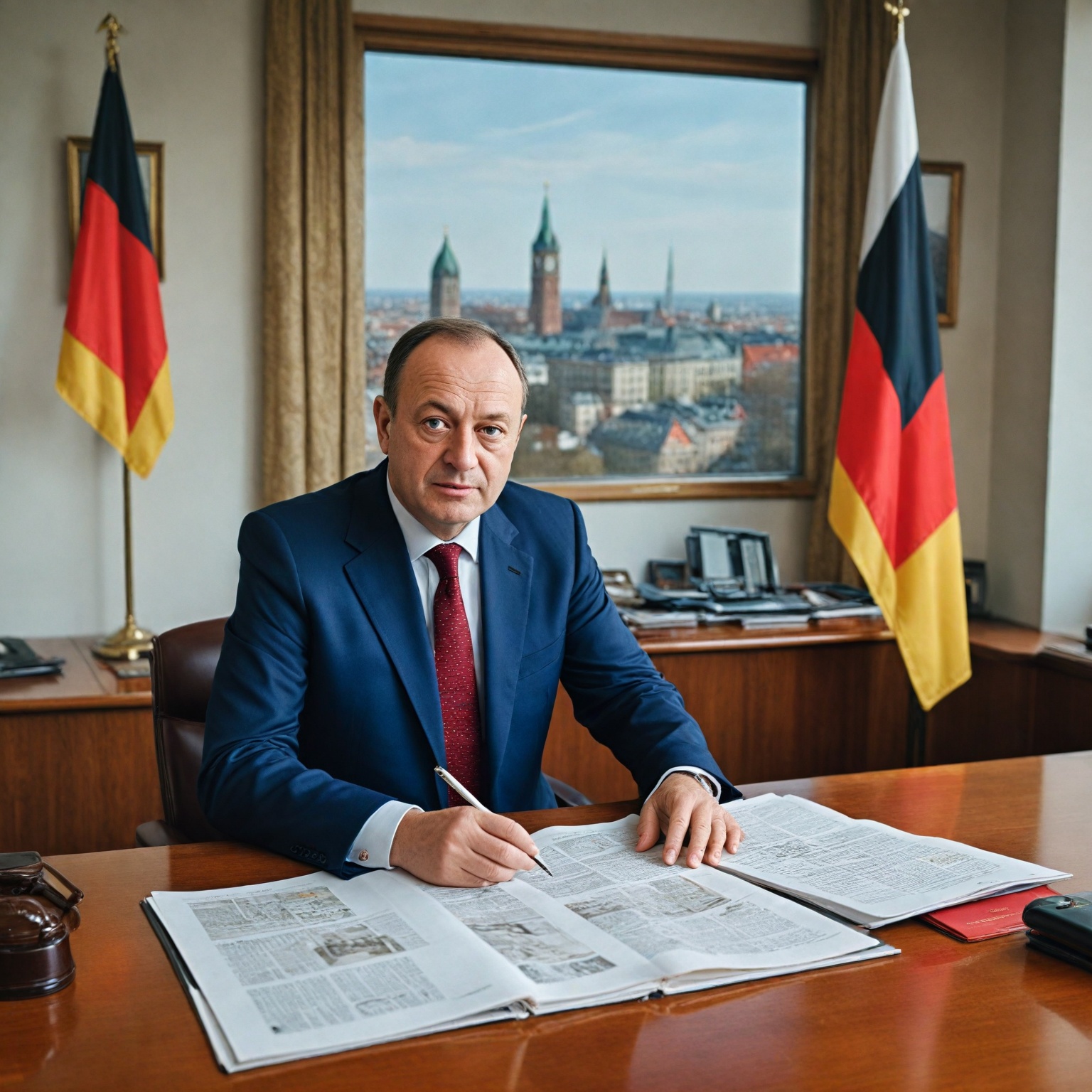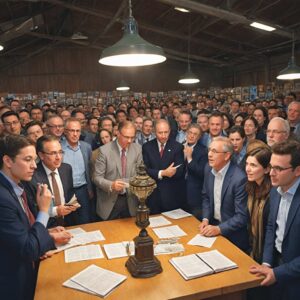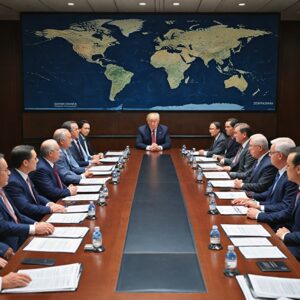Summary
Friedrich Merz is a German politician and lawyer who, as of 2025, leads the Christian Democratic Union (CDU) and serves as Chancellor of Germany, steering the country through a complex period marked by economic challenges, geopolitical shifts, and contentious domestic debates. Known for his pro-business conservatism and traditionalist social views, Merz has been a prominent figure within the CDU for decades, with a career spanning roles in the European Parliament, the Bundestag, and significant stints in the corporate legal sector. His leadership marks a return to a more economically liberal and socially conservative agenda after years dominated by centrist and progressive policies under predecessors like Angela Merkel.
Merz’s political ascent culminated following the 2025 federal election, where the CDU emerged as the largest party but failed to secure an absolute majority, resulting in challenging coalition negotiations with the Social Democratic Party (SPD). His initial failed bid to become chancellor on the first ballot exposed deep divisions within Germany’s fragmented parliament and underscored the difficulties of governing in a polarized political environment. Despite these obstacles, Merz’s eventual appointment as chancellor positioned him at the center of efforts to address Germany’s pressing issues, including economic reform, migration policy, and national security.
Central to Merz’s policy platform is a strong emphasis on economic liberalization, advocating for lower corporate taxes, reduced government intervention, and a recalibration of Germany’s climate policies toward greater market pragmatism. His migration stance is notably stringent; he has criticized the 2015 open-border policy and pushed for tightened asylum regulations and greater integration demands, which have drawn both support and sharp criticism for allegedly enabling far-right influence within parliamentary processes. On defense, Merz favors increased military spending and has called for the reinstatement of compulsory service, reflecting heightened security concerns amid shifting global dynamics.
Merz’s leadership is thus marked by significant controversy and high stakes. While supporters view him as a decisive force capable of revitalizing Germany’s economy and restoring political stability, critics caution that his conservative social policies and hardline migration approach risk deepening societal divisions and straining Germany’s coalition governance. As Germany navigates this challenging future under Merz, his tenure will be closely watched by domestic and international observers alike for its impact on Germany’s role in Europe and the broader world.
Early Life and Career
Friedrich Merz was born into a family marked by both intellectual pursuit and personal tragedy. Two of his three siblings died at relatively young ages, with his younger sister passing away at 21 in a traffic accident and his brother dying before reaching 50 due to multiple sclerosis. From 1966 to 1971, Merz attended the Gymnasium Petrinum Brilon but was transferred for disciplinary reasons to the Friedrich-Spee Gymnasium in Rüthen, where he completed his Abitur in 1975.
Merz studied law, graduating in 1985. After finishing law school, he worked as a judge and corporate lawyer. His legal career included a period as senior counsel with Cornelius Bartenbach Haesemann before joining Mayer Brown’s Düsseldorf office in 2004, where he focused on mergers and acquisitions, banking and finance, and compliance. His work in corporate law, along with serving on the boards of numerous companies including BlackRock Germany, helped establish him as a multimillionaire. Additionally, Merz is a licensed private pilot and owns two airplanes.
Merz’s political career began in 1989 when he was elected to the European Parliament. After serving one term, he was elected to the Bundestag, where he became the leading financial policy expert within the Christian Democratic Union (CDU). Notably, in the 1990s, Merz took conservative stances within his party, voting against liberalizing abortion laws, opposing preimplantation genetic diagnostics, and supporting the criminalization of marital rape — positions that at times placed him in the minority even within the CDU.
Following a period away from active politics during which he advanced his corporate legal career, Merz announced his return to politics in 2018. Throughout his career, he has been a polarizing figure, at times accused of veering between inclusive rhetoric and dog whistling, including controversial remarks regarding integration and asylum seekers.
Political Career
Friedrich Merz began his political career with his election to the European Parliament in 1989 at the age of 33, marking his transition from law into full-time politics. Early on, he was recognized as a leading financial policy expert within the Christian Democratic Union (CDU) and subsequently secured a seat in the Bundestag. In 2000, Merz was elected chairman of the CDU/CSU parliamentary group, coinciding with Angela Merkel’s election as chairwoman of the CDU. During this period, Merz and Merkel were considered chief rivals for party leadership, with Merz initially holding significant influence within the parliamentary group.
Following the 2002 federal election, Merkel assumed the chairmanship of the parliamentary group, and Merz became the deputy parliamentary group leader. This marked a turning point in their rivalry, culminating in Merz’s resignation from his leadership role in December 2004 and his gradual withdrawal from active politics. He left the Bundestag entirely in 2009 to focus on his legal career but remained politically engaged behind the scenes.
Merz returned to the political forefront in 2021, seeking to realize his long-held ambition of becoming chancellor. His initial attempt was marked by an unexpected defeat in the Bundestag vote, becoming the first chancellor-designate in postwar German history to fail to secure an absolute majority on the first ballot. This surprise loss sparked significant political uncertainty and highlighted divisions within his coalition, as well as challenges in garnering unanimous support among center-right and coalition partners. Speculation about internal dissent, including from Social Democratic MPs unhappy with compromises, added to the turmoil.
Despite this setback, Merz succeeded in securing the chancellorship on a subsequent vote, finally stepping into one of Germany’s most powerful political positions. However, the difficulties faced during this process raised concerns about his ability to effectively navigate coalition politics and push through contentious legislation amid a fragmented parliamentary landscape that includes the rising influence of the far-right Alternative for Germany (AfD). His ascendancy followed weeks of intense negotiations after the CDU emerged as the largest party in the federal election with 28.5 percent of the vote, surpassing the incumbent Social Democrats. Merz’s leadership is now seen as critical as Germany confronts steep domestic and international challenges, with European leaders closely watching his tenure.
Political Ideology and Policy Positions
Friedrich Merz is widely recognized as a pro-business conservative with a political ideology rooted in economic liberalism and traditional conservative values. He advocates for a reduction in corporate tax rates, lower energy prices, and policies aimed at encouraging people to transition from welfare to employment, reflecting his Ronald Reagan-style conservatism. Merz’s economic stance emphasizes limiting government intervention, as seen in his book *Mehr Kapitalismus wagen* (“Venturing More Capitalism”), which calls for a stronger embrace of capitalist principles.
On migration, Merz has taken a hardline approach, considering the limitation of irregular migration a central task for Germany following the 2025 federal election. He strongly criticizes Angela Merkel’s 2015 open borders policy during the European migrant crisis, labeling it as a “fatal” mistake. Merz supports rejecting asylum seekers directly at the border, particularly those arriving via other EU states, and has voiced opposition to generous welfare benefits for refugees, accusing some groups, including Ukrainians, of engaging in “welfare tourism.” His migration policy calls for adaptation to economic needs—such as addressing skilled labor shortages—while emphasizing migrants’ integration and conformity to the German “Leitkultur” or “leading culture,” a concept he has popularized. His proposals have sparked controversy, especially after he secured support from the far-right AfD party for a stricter immigration motion in parliament, a move criticized by mainstream parties for breaching the firewall against far-right influence.
In terms of energy and climate policy, Merz has expressed skepticism toward the current emphasis on climate change in German politics. While acknowledging that his party takes climate issues seriously, he has stated that the political debate on climate change is overrated and that the German public does not perceive it as an urgent problem to the same extent as politicians do. Merz has criticized the phase-out of nuclear power as a “grave strategic mistake” and has called for a shift away from the climate-centric economic policies pursued under Chancellor Olaf Scholz’s left-leaning government.
Merz also supports a stronger defense policy, advocating for the reintroduction of compulsory military service in Germany, a position that contrasts with the Social Democrats’ preference to maintain a voluntary system. During coalition negotiations, he reached an agreement to reform Germany’s debt brake to allow increased defense spending exceeding 1% of GDP, underscoring his prioritization of security.
On social issues, Merz holds conservative views. He has opposed gender-sensitive language reforms and voted against legislation criminalizing marital rape in 1997, reflecting his traditionalist stance on gender. Additionally, Merz’s economic policies have drawn criticism from economists who warn that his plans could lead to inflation and increased government debt, with projections estimating annual interest payments of approximately €71 billion by 2035 if implemented.
Leadership Challenges and Party Dynamics
Following the 2025 federal election in Germany, Friedrich Merz emerged as the leader of the Christian Democratic Union (CDU) and the frontrunner to become Chancellor. Although the CDU secured the most seats, it fell short of an absolute majority, prompting coalition negotiations primarily with the Social Democratic Party (SPD) under Lars Klingbeil. These negotiations aimed to form a government that could navigate Germany’s complex political landscape, including contentious policy areas such as migration and economic reform.
Merz’s leadership style and policy positions have sparked both support and criticism within his party and across the political spectrum. Seen as a socially conservative and economically liberal figure, Merz represents the traditional establishment conservative and pro-business wing of the CDU. His advocacy for economic liberalism, including lowering corporate tax rates and reducing welfare dependency, aligns him with a Ronald Reagan-style conservatism, though critics describe his political approach as erratic and shortsighted. Internally, his leadership has faced skepticism, with speculation about dissent among CDU members during key votes and some resistance to his solo political initiatives.
Migration policy remains a central and polarizing issue under Merz’s leadership. He strongly criticizes Angela Merkel’s 2015 open-border policy during the European migrant crisis and emphasizes the need to limit irregular migration post-2025 election. While Merz insists that his proposals for stricter migration control have been shared with other parties like the SPD, Greens, and FDP, mainstream opposition parties accuse him of shifting the CDU away from the political center and breaching an informal “firewall” by indirectly benefiting from far-right AfD votes in parliamentary decisions. SPD leader Rolf Mützenich warned that the CDU’s cooperation with the AfD on migration matters could have lasting reputational damage.
The broader political environment is marked by tension over how to balance domestic security concerns with economic needs such as addressing skilled labor shortages. Merz promotes integration through adherence to a “Leitkultur” or “German leading culture” and rejects gender-sensitive language reforms, reflecting his conservative social views. Opposition parties have accused him of electioneering and warned that failure to deliver on his promises could erode public trust.
Within the CDU, Merz’s ascent has not been without internal negotiation. After losing a leadership contest, he proposed joining the existing government as Economy Minister, a move rebuffed by party leadership, though he was subsequently incorporated into Armin Laschet’s campaign team. Merz’s firm stance against the AfD, labeling it as opposing Germany’s Western orientation, eurozone membership, and NATO, underscores his attempt to delineate the CDU’s political boundaries despite the fraught coalition dynamics.
Strategic Plans and Vision for Germany’s Future
Friedrich Merz has laid out a strategic vision for Germany that emphasizes a shift away from the current government’s climate-focused economic policies toward a more market-driven approach. During his campaign, Merz criticized the left-leaning coalition government under Chancellor Olaf Scholz for prioritizing climate protection almost exclusively, and he expressed a clear intention to change this direction. His proposed economic reforms, outlined in his book *Mehr Kapitalismus wagen* (“Venturing More Capitalism”), advocate for stronger economic liberalism and a reinvigoration of capitalism in Germany.
Merz aims to balance economic growth with pragmatic energy policies, moving away from the accelerated green transition pursued by the previous coalition. While Germany currently leads the European Union in green infrastructure—holding the largest number of solar and wind production facilities and ranking second in heat pump manufacturing—Merz has suggested a radical change in approach that might recalibrate these priorities to favor economic competitiveness and industrial interests.
In the realm of migration, Merz has positioned himself firmly on tightening Germany’s migration and asylum laws. He has described the current system as “inconsistent” and advocates for reforms that align migration policy with economic needs, particularly addressing skilled labor shortages, while emphasizing integration through adherence to the *Leitkultur* or “German leading culture,” a concept he has popularized. His five-point migration plan, which significantly tightens asylum and migration regulations, was passed by the Bundestag, reflecting his influence in shaping the country’s immigration framework. Merz also views the open-border policy during the 2015 migrant crisis as a critical error, reinforcing his conservative stance on migration.
Merz’s broader political vision combines three core pillars: Europeanism, Atlanticism, and a “Germany first” approach. He supports strengthening Germany’s role within the European Union and NATO, advocating for pragmatic cooperation that benefits German economic interests. His government would likely avoid rhetoric promoting European autonomy, instead seeking to reinforce NATO ties and encourage European leadership within the alliance. This strategy aims to reconcile German business interests with transatlantic relations, particularly in light of past tensions such as those experienced during the Trump administration.
Finally, Merz has acknowledged the political and economic opportunity presented by integrating strengthened green initiatives into his program. He recognizes the potential benefits of such measures in securing long-term growth and competitiveness for Germany, even as he seeks to temper the pace and scope of the existing green transition to ensure economic viability.
Impact and Legacy
Friedrich Merz’s ascent to leadership in Germany marks a pivotal moment characterized by both significant opportunities and considerable challenges. As Federal Chairman of the Christian Democratic Union (CDU) and leader of the CDU/CSU parliamentary group, Merz has positioned himself as a central figure aiming to redefine Germany’s political and economic trajectory.
One of the foremost aspects of Merz’s impact is his proposed policy agenda, which includes an explosive five-point plan on migration that has already revealed divisions within the European centre-right, particularly with his European People’s Party (EPP) allies. This approach signals a potential shift in Germany’s stance on immigration and border security, which may reverberate throughout European politics. Additionally, Merz’s election-night emphasis on achieving greater independence from Washington underscores a broader strategic vision for Germany and Europe that seeks to recalibrate transatlantic relations and enhance Germany’s geopolitical autonomy.
Economically, Merz’s leadership comes at a critical juncture. With Germany facing the risk of losing a once-in-a-generation economic opportunity, Merz has advocated for increased defense spending—a move he proposed explicitly on 5 March 2025—which reflects a recognition of the changing global security environment and Germany’s role within it. Moreover, integrating strengthened green initiatives into his program could afford Germany both political and environmental benefits, balancing economic growth with sustainability in the face of climate change.
Despite these ambitions, Merz’s authority is tested by the political realities of coalition-building in post-election Germany. Although the CDU emerged as the strongest party under his leadership, it fell short of an absolute majority, necessitating complex negotiations with the Social Democratic Party (SPD) led by Lars Klingbeil. The anticipated coalition, often referred to as a Große Koalition (Grand Coalition), reflects Germany’s ongoing tradition of power-sharing but also highlights the intricate compromises required in the current political landscape.
In sum, Friedrich Merz’s tenure is poised to leave
The content is provided by Sierra Knightley, Fact-Nest













